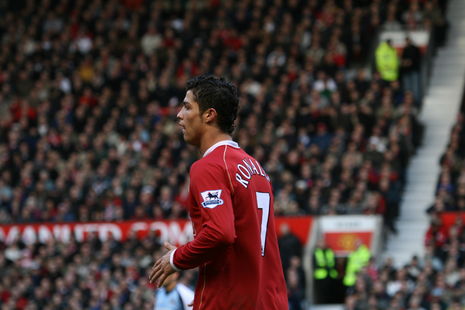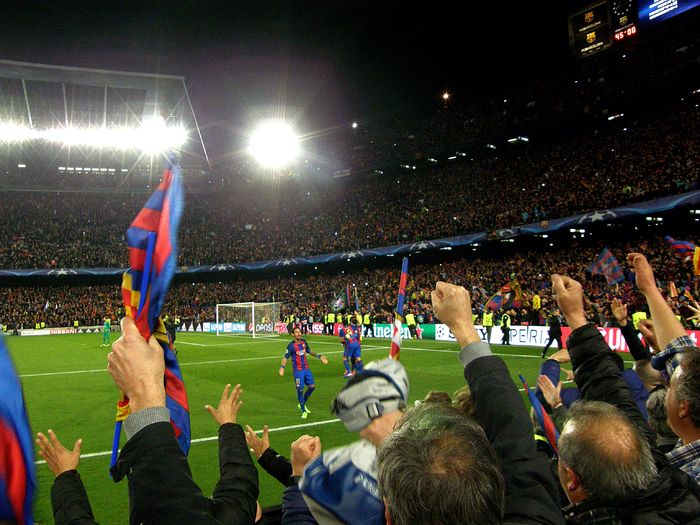UK’s Saturday football blackout: traditional or outdated?
Following on from Cristiano Ronaldo’s sensational return to the Premier League last month (11/09), Jack Wadding questions whether the decision not to broadcast Saturday 3pm games should be a thing of the past

An academic year abroad is, first and foremost, a linguistic experience, but living in Paris for the last few weeks has been more of a cultural change than I originally imagined. Being one of the biggest footballing nations in the world, le beau jeu (the beautiful game) features significantly in French sporting culture and, despite its proximity to the UK, there are a surprising number of differences. Many of the chants have no resemblance to those found in England; the language used to describe the game, by both commentators and supporters, is noticeably unique; and it is Sundays, rather than Saturday afternoons, when the top flight play out the majority of its fixtures.
These cultural norms may appear strange to Premier League football fans, but what I have come to notice is that the French, and in fact Europe more generally, view English footballing tradition as unique, to put it nicely. This became particularly apparent when L’Équipe, one of France’s biggest sports journals, published an article informing its readers that, for some bizarre reason, no one in England would be able to (legally) watch the historic return of Cristiano Ronaldo to the Premier League. Their exact words were: “C’est le match que tout le monde veut voir, mais que [presque] personne ne verra en Angleterre” (It’s the match that everyone wants to watch, but almost no one in England will see). And they weren’t wrong. As Italian publication La Gazetta dello Sport detailed, the momentous occasion at Old Trafford was beamed to 189 countries around the world, yet England was not one of them.
“You wake up on Saturday, you watch the lunchtime game, you tune into Soccer Saturday, then the evening fixture and, crucially, you round it all off with Match of the Day”
When you take some time to consider, it is understandable that the rest of Europe found the situation somewhat illogical. Arguably, the match between Manchester United and Newcastle United that weekend (11/09) was one of the most memorable moments in the Premier League’s 30-year history. The fact that it was banned from broadcast is, as the majority of British viewers will know, a result of the Saturday afternoon blackout. The regulation was instigated in the 1960s, with the permission of UEFA, in order to protect the attendance figures of all football in the UK, particularly those in the lower leagues whose gate income plays an important role in their survival. Given that it’s been in place for so long, the rule has inevitably become entrenched in British football tradition.
You wake up on Saturday, you watch the lunchtime game, you tune into Soccer Saturday, then the evening fixture and, crucially, you round it all off with Match of the Day. That’s just how it is. But this seems to genuinely confuse our European counterparts, who have chosen not to implement UEFA’s optional legislation. German newspaper Bild posted a video discussing the “Kuriose Regel” (curious rule), adding that “Das würde es in Deutschland nicht geben!” (That would not fly in Germany!). Furthermore, Spanish publication El País had some strong words about the English “rarezas” (eccentricities), likening the tradition to our stubborn adherence to driving on the left despite the rest of the world doing otherwise.
“Growing up consuming Premier League football in such a regulated way made the unrestricted access of Project Restart, as well as the ensuing season, feel somehow wrong”
So, is it really worth listening to what Europe has to say? Are we doing it all wrong? There are certainly many in the UK who would argue so. Over the course of the pandemic, we had a lengthy trial run. Since fans weren’t able to attend games, the broadcast ban was sensibly lifted and every single top-flight game was available to watch across the weekend from Friday to Monday. Although introduced as a drastic measure to mitigate the pandemic’s impact, the change in routine was an attractive one.
I, for one, spent many weekends watching all ten games back to back. Indeed, some voices within the game, Leyton Orient chairman Nigel Travis being one of them, believe that the law is no longer relevant, as attendance-related revenue is not significantly affected by the draw of live Premier League football anymore, especially with the rise of live streaming throughout the English Football League.
Equally, there are a number of voices who strongly oppose a change to the status quo. Unsurprisingly, EFL Chairman Shaun Harvey is one such voice. He, and many others, believe that the blackout is “absolutely vital” to the maintenance of the English football pyramid, something of which we are extremely proud of as a nation. In truth, no other country in Europe sustains four fully professional football leagues.
Ultimately, we cannot know for sure whether a shake up in fixture scheduling and broadcasting rights would damage or improve the English model. It seems to work in Europe but, at the end of the day, is there really a need to start over? Just as the French have their sporting culture, so too does the UK, and the Saturday afternoon blackout, believe it or not, plays a notable role in it. Growing up consuming Premier League football in such a regulated way made the unrestricted access of Project Restart, as well as the ensuing season, feel somehow wrong. And I believe that the majority of the UK would agree. There is only so much football that can healthily be enjoyed on a given weekend.
Despite the recent debacle over the inaccessibility of Ronaldo’s homecoming last month, it doesn’t appear that too much will change. Yes, there are moments when the blackout is frustrating and, realistically, many viewers find other means of watching matches within the banned time slot. However, for the most part, England is far too attached to its Saturday routine for any fundamental changes to arrive any time soon, and all the better for it.
 News / Colleges charge different rents for the same Castle Street accommodation2 March 2026
News / Colleges charge different rents for the same Castle Street accommodation2 March 2026 News / King’s hosts open iftar for Ramadan3 March 2026
News / King’s hosts open iftar for Ramadan3 March 2026 Theatre / Lunatics and leisure centres 4 March 2026
Theatre / Lunatics and leisure centres 4 March 2026 News / Angela Merkel among Cambridge honorary degree nominees27 February 2026
News / Angela Merkel among Cambridge honorary degree nominees27 February 2026 News / News in Brief: waterworks, wine woes, and workplace wins 1 March 2026
News / News in Brief: waterworks, wine woes, and workplace wins 1 March 2026









